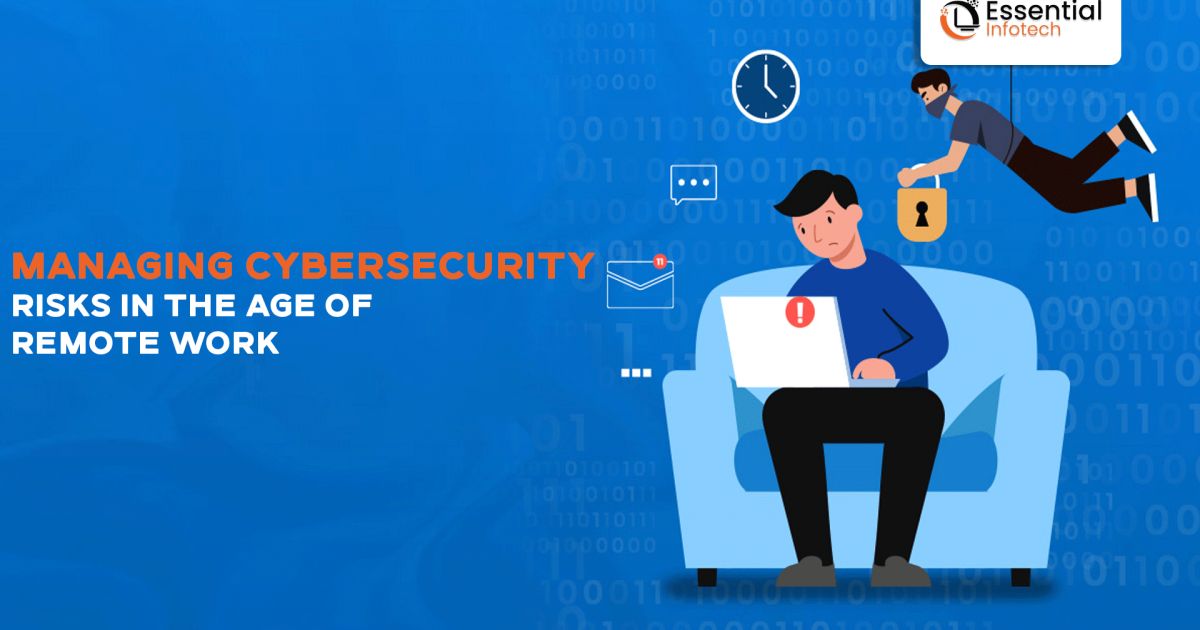

Managing Cybersecurity Risks in the Age of Remote Work
Remote work has become the new standard in today's digital environment, offering greater productivity and flexibility than ever before. But in addition to all of its advantages, working remotely presents a number of cybersecurity risks that need to be addressed by businesses in order to protect infrastructure and sensitive data. It is critical for businesses to comprehend and mitigate cybersecurity risks in the era of remote work as they adjust to this changing paradigm. Let's examine how to strengthen remote work environments and examine the terrain of cyber dangers.
The Rise of Cybersecurity Threats
Attacks by Phishing-
Phishing attacks are still a major concern since they take advantage of people's weaknesses by sending false emails, texts, and visiting websites. Because remote workers use different devices and places to access business networks, there is an increased chance that they will fall victim to phishing attacks. Cybercriminals take advantage of the popularity of remote work by posing as reliable sources in order to obtain login credentials, spread malware, and access private information.
Endpoint Security Flaws-
Numerous endpoints, such as laptops, smartphones, and Internet of Things gadgets, are introduced into business networks through remote work. Every endpoint can be a point of entry for ransomware, malware, and unwanted access attempts, among other cyberthreats. Organizations that do not have strong endpoint security measures run the danger of experiencing data breaches, network attacks, and data exfiltration.
Unsafe Wireless Networks-
Because public Wi-Fi networks don't use encryption and can be vulnerable to eavesdropping and man-in-the-middle attacks, they inherently carry security hazards. When remote employees use unprotected Wi-Fi networks to access company resources, confidential and sensitive data integrity is put at risk. Data transferred over unsecure networks may be vulnerable to interception, interception, and unauthorized access if sufficient security measures are not taken.
Reducing the Risk of Cybersecurity
Training and Education for Employees-
To reduce the danger of cyber risks, remote personnel must be provided with thorough cybersecurity awareness training. Through training employees on common attack vectors, phishing signs, and best practices for secure remote work, organizations enable staff members to identify possible threats and take proactive measures to mitigate them. Organization-wide vigilance is fostered and cybersecurity hygiene is reinforced through regular training sessions and simulated phishing exercises.
Multiple Factor Verification (MFA)-
Multi-factor authentication provides additional security to remote access systems by requiring users to provide multiple kinds of verification to confirm their identities. By combining passwords with biometric authentication, security tokens, or one-time passcodes to lessen the risk of unauthorized access, multifactor authentication (MFA) improves the overall security posture of remote work environments.
Solutions for Safe Remote Access-
Encrypted communication routes between remote workers and corporate networks are ensured by deploying secure remote access solutions, such as virtual private networks (VPNs) and remote desktop protocols (RDP). By tunneling traffic through encrypted connections, these solutions reduce the possibility of data breaches and network incursions by protecting sensitive data from interception and unauthorized access.
Conclusion
Organizations must continue to be alert in protecting against cybersecurity dangers that come with the paradigm shift toward remote work as it continues to influence the nature of work in the future. Organizations may reduce the risks associated with phishing attempts, endpoint vulnerabilities, and unsecure Wi-Fi networks by emphasizing cybersecurity education, putting strong security measures in place, and cultivating a culture of security awareness. Organizations may reap the benefits of remote work while protecting infrastructure and sensitive data from ever-changing cyber threats by adopting proactive cybersecurity policies. Cybersecurity is still essential in the era of remote work to maintain consumer trust, assure company continuity, and maintain organizational resilience in the face of constantly changing threats.
We Are A Leading IT Company Experienced In Creative And Innovative Development And Design Solutions .